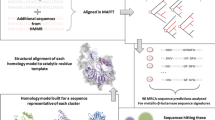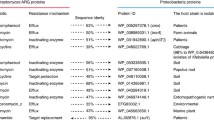The OXA genes encode a class of b-lactamases that confer resistance to a wide range of b-lactam antibiotics. To determine whether the diversity of the OXA b-lactamases is the result of recent or ancient events, and to determine whether mobilization of the OXA genes from chromosomes to plasmids occurred recently or long ago, we have constructed a Bayesian phylogeny of the OXA b-lactamase genes. Analysis of that phylogeny shows that much of the diversity is the result of ancient events and that the OXA genes were mobilized from chromosomes to plasmids on at least two independent occasions that occurred millions of years ago. That observation contradicts the commonly held impression that mobilization of antibiotic resistance genes is strictly the result of modern use of antibiotics.
Similar content being viewed by others
Author information
Authors and Affiliations
Rights and permissions
About this article
Cite this article
Barlow, M., Hall, B. Phylogenetic Analysis Shows That the OXA b-Lactamase Genes Have Been on Plasmids for Millions of Years . J Mol Evol 55, 314–321 (2002). https://doi.org/10.1007/s00239-002-2328-y
Received:
Accepted:
Issue Date:
DOI: https://doi.org/10.1007/s00239-002-2328-y




